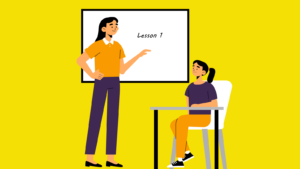Modern Radio: Exploiting Podcasts in the EFL Classroom
Door to door, it takes me about an hour and five minutes to get to work every day. Without podcasts, my 52-minute train journey would be unproductive, wasted, and—most importantly—boring. Now, don’t get me wrong. I think so-called dead time has an important role in our often too-busy lives. That being said, I firmly believe that podcasts are great for both learners and non-learners alike.
What is a podcast? Or, better put, what isn’t a podcast?
For those of you who need a quick refresher, a podcast is, essentially, a piece of recorded audio made available to be streamed from a website or app or downloaded onto a device. But that’s pretty much where the similarities end. Ask an avid podcast listener what a podcast is and you may have to wait a minute for a satisfactory definition. That’s because, aside from its technical description, a podcast could be anything at all, content-wise. An engaging story with high production value, a 10-minute summary of the day’s top news stories, or—my particular favorites—a couple of friends talking about a topic they’re passionate about. It’s exactly this loosely- or completely un-scripted dialogue that makes podcasts especially rich resources for learners.
How can podcasts improve your students’ learning?
If, like me, your interaction with your learners is limited to a mere 90 minutes a week, then podcasts can be a great way to encourage them to incorporate more English into their lives outside the classroom. For several years I worked as an in-house business English trainer at various companies. If you’ve ever taught in this context then you’ll know the familiar excuses for missed classes: a meeting, a last-minute conference call, or a client visit on short notice. These constant interruptions make 90 minutes a week look like a luxury. But with podcasts, learners can engage with topics they’re interested in in their target language. Aside from simply offering more contact with the language, podcasts offer a few more additional benefits for your learners.
Firstly, they’re completely or at least partially authentic. I am often frustrated by the inauthentic nature of listening materials produced for ELT course book and related materials. The accents are fake and the speakers are all actors. Not to mention the dialogue is often stiff and unrealistic. As I mentioned, many podcasts are completely unscripted. This provides the learner with authentic, “real” input, thus allowing them to practice comprehension through context and at a natural speaking speed.
Secondly, they’re free. Course books can be very expensive for the cost-bearer, whether that be the student or the school. Either way, podcasts are a much cheaper alternative to course book audio files and over-produced materials.
Thirdly, they’re portable. Once a podcast is downloaded to a listener’s phone, he or she is able to listen to it anywhere—with or without an internet connection. Suddenly, their commute to work is transformed into a learning opportunity and they leave their workout at the gym knowing three new English words.
Fourthly, they offer endless variety. Please trust me when I say: there is a podcast out there for everyone. One student I worked with was responsible for working with car dealers, often non-German speaking ones, too. Unsurprisingly, cars weren’t just a professional interest for him. A quick Google search for “best automotive podcasts” led me to a podcast chart site which I then passed on to my learner and encouraged him to take a look and choose something that appealed to him.
Fostering learner autonomy
Finally, the biggest benefit of getting your learners interested in podcasts is that they help foster learner autonomy. When your learners find and enjoy something they can do independently, away from the classroom, they are able to take control of their learning and progress faster than a student who relies heavily on teacher input and support.
Once you’re able to sell your learners on the benefits of listening to podcasts (if you’ve forgotten already, see above), you will find that they are more committed to you, as well as your course. Learner buy-in is an absolute must in all teaching situations; if the student doesn’t see the benefit of what you’re doing, he or she won’t put in the effort and any chance at learning is lost. By giving them the chance to do something they enjoy in a foreign language, learners will have a more positive association with learning English and with the language itself. And finally, when implemented successfully, podcasts in the classroom will leave you with a more motivated learner, perhaps even one who goes off and finds podcasts on his or her own.
Creating classroom tasks
If you’ve managed to convince yourself and your learners that podcasts can and should be used to learn English, then you’ve actually already done most of the hard work. Creating tasks can be as time-effective or –intensive as you make it. Tasks should be adapted to the level of the classroom but they could range from something as simple and easy for the teacher as:
Who is speaking?
What are their names and jobs?
Who was your favorite speaker? Why?
Write down two things you learned from the podcast.
Create a discussion question for the class.
Describe the podcast to your partner in one minute or less.
…to:
Worksheets with comprehension questions
Transcriptions or gap-fills
Variety of lower and higher order thinking tasks
Vocabulary lists
Projects
Recording your own podcast
All of these tasks can be adapted for classes as low as A2 with no upper limit. I would normally ask a few comprehension questions to make sure my students had understood the basic premise of the podcast, and then I’d open it up with a discussion question which asked them to evaluate the topic or speaker or create their own examples. It’s up to you whether you want to exploit the podcast itself or use it as a jumping off point for a creative venture.
Why don’t you try it yourself? Here’s a link to one of my favorite episode of BBC’s The Why Factor. Listen to the first 2 minutes with a pen and paper at hand and you’ll be surprised how many questions or tasks you can come up with in such a short time. Depending on the length of your classes, you could plan to listen together in class or give the tasks as optional or mandatory self-study which students can do at their own pace. Once you get started you’ll get a feeling for what your students get out of it and how you can encourage more home practice.
I encourage you to use podcasts in your classrooms in order to:
-Challenge yourself to try something new
-Encourage learner autonomy in your students
-Motivate them to engage with the broader English-speaking world
-Facilitate higher order thinking in your learners
-Good luck and let me know how it goes in the comments below!
Further resources:
Podcasts for English learners:
BBC Learning English
6 Minute English
The English We Speak
6 Minute Grammar
6 Minute Vocabulary
British Council
Elementary Podcasts
Business English Pod
Podcasts for English teachers:
TEFL Commute (Lindsay Clandfield and Shaun Wilden)
The TEFL Show (Marek Kiczkowiak and Robert McCaul)
ESL Teacher Talk





2 Responses
Martin Cooke
Good article Vicky. I have actually taken the next step with my own learners and we now produce our own podcasts - it works really well and I'd definitely encourage other teachers to try it. I'll try to type up a reply to your article or a blog post to explain how our learner-produced podcast came into being and how it's progressed so far.
03/09/2017
Vicky P
Thanks, Martin! I've definitely toyed with the idea of getting students to record their own podcasts. I'm working with university students at the moment and it's no small victory to just get them to listen! But do let me know how you get on or if you have any other tips. I attended a great talk by Mia Aghajari and Laura Edwards on this very topic! Here's their blog post about it: http://grownupenglish.com/listening-to-the-experts-podcasting-in-the-business-english-classroom/
20/09/2017